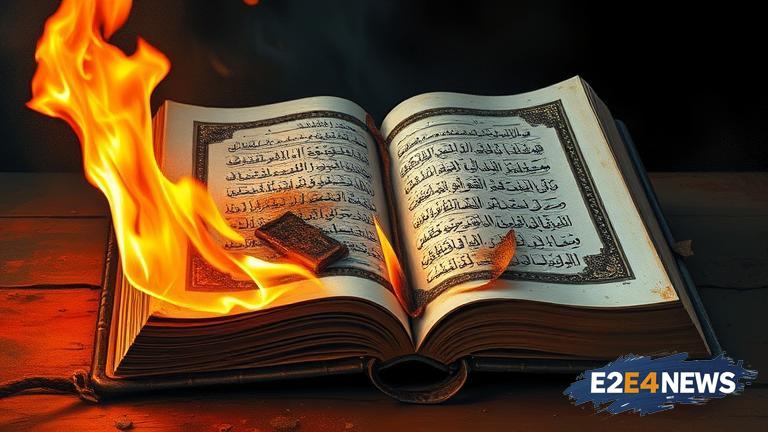In a landmark case that has sent shockwaves throughout France, a man has been sentenced to prison for burning a Quran, a move that has ignited a fierce debate on the limits of free speech and the role of religion in the country. The incident occurred in the city of Paris, where the man, whose identity has not been disclosed, was found to have burned a copy of the Quran in a public place. The act was deemed a serious offense by the French authorities, who swiftly arrested and charged the individual with desecrating a religious text. The court’s decision to sentence the man to prison has been met with widespread criticism from free speech advocates, who argue that the move sets a dangerous precedent for the restriction of freedom of expression in France. On the other hand, many Muslims in France have welcomed the court’s decision, seeing it as a necessary measure to protect their religious rights and prevent hate speech. The case has also sparked a wider debate on the role of Islam in French society, with some arguing that the country’s secular values are being eroded by the growing influence of Muslim communities. Others have countered that the sentence is a clear example of the French state’s commitment to protecting the rights of all citizens, regardless of their religious beliefs. The Quran burning incident has also raised questions about the limits of free speech in France, with some arguing that the country’s laws on hate speech and blasphemy are too restrictive. The French government has faced criticism in the past for its handling of free speech issues, particularly in relation to the Charlie Hebdo attacks in 2015. The country’s strict laws on hate speech have been seen as a necessary measure to prevent the spread of extremist ideologies, but others have argued that they stifle legitimate debate and criticism. The Quran burning case has also highlighted the tensions between France’s secular values and the growing influence of Muslim communities in the country. Many Muslims in France have expressed concerns about the rise of Islamophobia and anti-Muslim sentiment, which they see as being fueled by the country’s strict laws on secularism. The French government has sought to address these concerns by promoting greater understanding and tolerance between different religious communities. However, the Quran burning incident has shown that there is still much work to be done to address the deep-seated tensions and prejudices that exist in French society. The case has also sparked a wider debate on the role of religion in public life, with some arguing that the French state should do more to promote greater understanding and respect between different religious communities. Others have countered that the state should remain neutral on matters of religion, and that individuals should be free to practice their faith as they see fit. The Quran burning incident has also raised questions about the impact of social media on free speech and hate speech, with some arguing that online platforms have created new opportunities for extremist ideologies to spread. The French government has faced criticism for its handling of online hate speech, with some arguing that it has not done enough to prevent the spread of extremist ideologies online. The Quran burning case has shown that the French authorities are taking a tough stance on hate speech and blasphemy, but it remains to be seen whether this approach will be effective in preventing the spread of extremist ideologies. The case has also highlighted the need for greater education and awareness about different religious communities and their beliefs, in order to promote greater understanding and tolerance. The French government has launched a number of initiatives aimed at promoting greater understanding and respect between different religious communities, but more needs to be done to address the deep-seated prejudices and tensions that exist in French society. The Quran burning incident has sparked a wider debate on the role of free speech and religion in French society, and it remains to be seen how the country will balance these competing values in the years to come. The case has also raised questions about the impact of the sentence on the man’s life and livelihood, with some arguing that the punishment is disproportionate to the offense. The French authorities have defended the sentence, arguing that it is necessary to protect the rights of all citizens and to prevent hate speech. The Quran burning incident has also sparked a wider debate on the role of the media in shaping public opinion and promoting greater understanding and tolerance. The case has shown that the media has a critical role to play in promoting greater understanding and respect between different religious communities, and in preventing the spread of extremist ideologies. The French government has faced criticism for its handling of the media and its role in shaping public opinion, with some arguing that it has not done enough to promote greater understanding and tolerance. The Quran burning incident has highlighted the need for greater nuance and complexity in public debates about free speech and religion, and for a more thoughtful and considered approach to these complex and sensitive issues.





